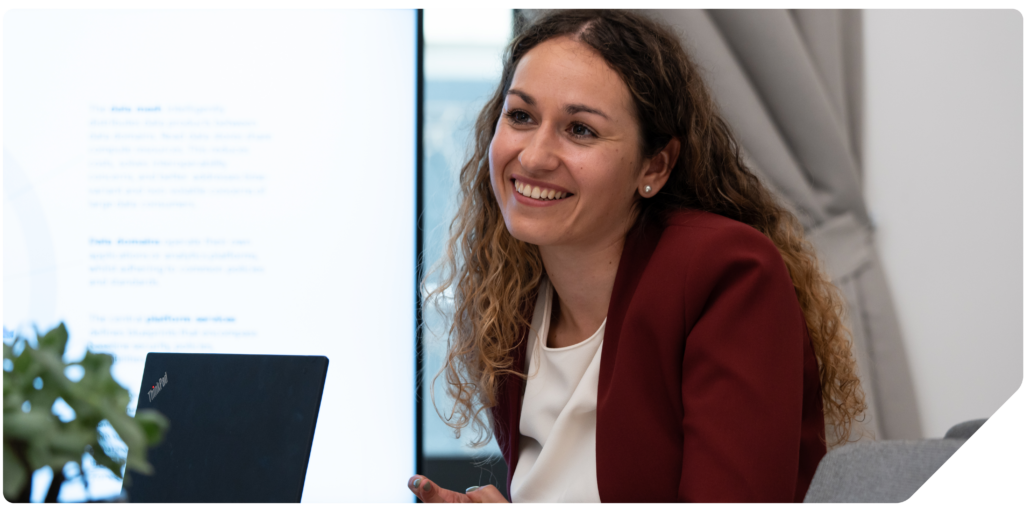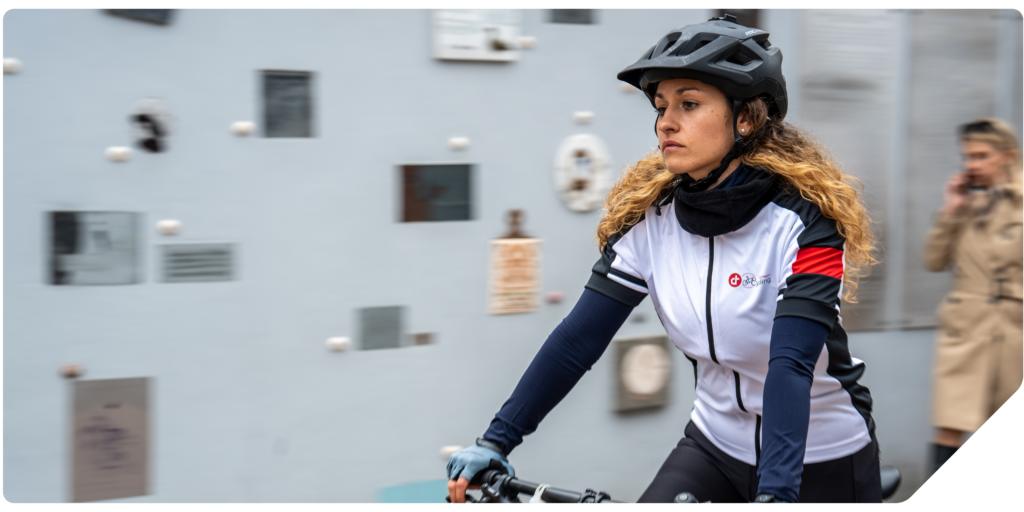- en
Andrea Coifman
Two weeks – that’s how long it took for Andrea to find a job in Vilnius. Originally from Venezuela, she moved to Lithuania from Denmark to work as a Senior Data Scientist at Devoteam. We discussed with Andrea the pros of living in Lithuania, moving countries during the pandemic, and mentoring young tech specialists.

I also get a lot of support in developing myself as a professional and leader. I spend a lot of time trying to help other people get into tech, especially women.
You have lived in the US, Spain, and Denmark. When and why did you choose to relocate to Lithuania?
I decided to move to Lithuania during the COVID-19 pandemic, in February 2021. There was no vaccine back then. My partner, who is Lithuanian, and I were just two foreigners stuck in our apartment in Copenhagen, without our family members around. We felt that we were a bit lonely, and that if we want to grow our family or do something more, we really need to get out of there.
At that time, my partner was also job hunting. He works in business development, and it can be challenging to find a job in that field in Denmark if you don’t speak the language. So we started thinking about other options. What made the most sense for us was to try out Lithuania as our next career destination. So I told my partner, “Look, get a job in Lithuania, and I will pack my things and go.” And it took him a week or two to get a job! Since I work in the tech field, we were less worried about me not finding a job.

How long did it take for you to find a job here?
It took me two weeks. I had two offers, so I could choose. Obviously, I went for the one that was more beneficial for me, financially and otherwise. I liked both companies and the people at them, so it came down to which company worked with top technologies. As Devoteam works with cloud, I chose them.
What do you like most about your role at Devoteam? What are your daily responsibilities?
Currently I’m covering a Senior Data Scientist position. I work across multiple teams, helping each of them integrate AI functionalities in their products. In some teams, I’m in charge of building data systems and pipelines for analyzing, transforming, and organizing raw data from our customers, so our analytics team can easily generate data science reports and insights. Other teams focus on building data-driven products that provide innovative business solutions. My role in those teams is to research and develop augmented-intelligence algorithms that bring extra value when targeting our customer needs through our platform.
What I like the most about my job is that I get to do different things. I’m not going stale working with one technology. We work with the cloud, and the company invests a lot of money into new technologies. Any technology that I want to use, I’m able to. Every day I could say, “Oh, I like this new thing, I’d like to try it out”, and it’s fine. That’s pretty awesome.
I also get a lot of support in developing myself as a professional and leader. I spend a lot of time trying to help other people get into tech, especially women. On my day-to-day, I get to mentor women that want to get into IT and data science, especially the ones that are already working at Devoteam. I get trained for becoming a leader in the future, too. I can do all of these things at my job.
You are a mentor at Women Go Tech. Could you tell us about that experience?
While I was living in Denmark, I was actually working in Sweden, where I got involved in mentoring initiatives aimed at bringing women and kids into tech. But Women Go Tech is definitely better than any other program I’ve seen out there. It’s been around for a number of years already, and it’s very solid.
My approach to mentoring is treating people as friends. I don’t impose rules, like, “We’re going to do this and that in six months”. I simply like to be there for my mentees so they could contact me, and I could guide them along their tech path.
I have one Women Go Tech mentee at the moment. We’re meeting regularly to talk about how she wants to develop her career, and I advise her on what technologies to use and what things she should try doing. I don’t push people to get into tech or anything. I think Women Go Tech is more for them to explore if this field is a good fit for them.
Generally speaking, do you feel that Lithuania offers a good platform for women seeking to break into tech?
Some countries are keen to bring women into tech, and try to help them. But Lithuania is a step further than that – the country is really good at it. Of course, I’m speaking from the perspective of working in one company and volunteering at the Women Go Tech initiative. I don’t know how it works there in other companies in Lithuania. But I have noticed a huge difference in how people treat me as a woman in tech here compared to other countries.

What are the advantages of living in Lithuania versus Denmark?
In terms of advantages, I think a lot has to do with the people here. Obviously, your experience is different when you’re with someone who knows the country and speaks the language. But in Denmark, people like to gather in small groups and speak Danish among themselves. I didn’t manage to learn the language, so it was quite difficult for me to integrate. I feel like here, I can interact better with people despite not speaking the local language.
In my experience, people are very friendly in Lithuania. They really like you as a foreigner, they’re really curious about you. I think there are more foreigners in Denmark, so people there are like, “Ah, okay. You’re also from Spain, I know X number of people from there.” And here it’s more like, “Oh, wow! Where do you come from? I want to know a bit more about your culture.”
I’ve also found that work-life balance is amazing here. I actually live a better life in Lithuania than I did in Denmark. Of course, it might not apply to everybody. I’m also happy with the benefits I get in terms of work, specifically regarding personal development, flexibility, and remote work. For instance, I can go to visit my family in Spain whenever I want to and work from there.
What advice would you give for those considering moving to Lithuania?
I think people should come visit first. What people tend to do is go to these websites that compare countries, and they go like, “Let’s compare Sweden and Lithuania”. And they get average income and other stats that might be outdated. When you put all these things together, they don’t paint the full picture of your purchasing power. After all, I lived in Spain, I lived in Denmark, and now I’m here! And I can say that I live better in Lithuania for many, many reasons, which I wouldn’t have guessed looking at one of those websites. Even if I technically earn less, I can afford more.
Back in Denmark, I didn’t feel that I was advancing in life. There, you earn okay, but you’re lucky if you’re not sharing an apartment with other people. I pay three times less for my rent here and that’s a huge advantage.
And maybe people think, “It’s so far. There are probably not that many flights”, others buy into the hype of “I want to live in London and do all this stuff”. But it’s not the same. So my advice is to come here and see how people live in Lithuania. You’ll see, you’re gonna like it!. I mean, winters are cold, but to be honest, there aren’t a lot of countries in Europe where winter is very pleasant.
What do you like about living in Vilnius?
I like that Vilnius is compact and well-connected. I live in the outskirts of the city, but I still walk to work. In Denmark, even cities considered small are quite big, so it would be way more difficult. And I love the river. That’s something that people take for granted. A lot of capitals have rivers, but it’s just not the same. I’ve spent most of my life in Madrid, and we have this huge river there that’s way more contaminated, less accessible to people, and with fewer green areas around. Lithuania, meanwhile, is extremely green. I could say that it’s the greenest country in Europe, at least.

I also like the nightlife. I’m not a nightlife person, but people here actually enjoy going out, going downtown to meet others. It’s a very sociable country compared to Denmark. They have this hygge thing, which I understood as finding happiness through spending time with family and friends in a cozy environment, like staying at home or having a small picnic. The life in Vilnius, for me at least, feels way more active. Here, it’s more about spending time with your friends outside and doing a lot of activities.
When you leave your office after work, what do you do?
I do a lot of sports, but mostly biking, something I used to do in Denmark. I go on 30-40-kilometer rides. From where I live to the Green Lakes, for example. It’s a nice area for having a stroll before heading back home.
I also go out with my friends on weekends, and we do all kinds of activities. Paddleboarding, fishing. Bowling and eating out at restaurants in winter. There’s a lot of things to do here.
The interview was conducted in October 2021.